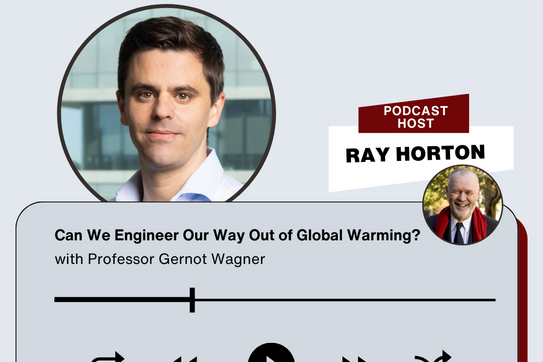In another session devoted to climate change, we focus on an unconventional way of halting global warming known as solar geo-engineering. In this session, host Professor Ray Horton speaks with Professor Gernot Wagner, faculty director of the Climate Knowledge Initiative at the Tamer Center for Social Enterprise and senior lecturer at Columbia Business School. Wagner is an expert in engineering solutions to the problem of climate change.
The conversation with Wagner begins with the meaning of solar geo-engineering, a technique that promises to play a role in halting global warming by surrounding Earth with a shield that block the sun’s heat from entering the atmosphere. He describes the process of creating the shield as uncomplicated technically and very much cheaper than the sums involved in the wide range of policies designed to reduce fossil fuel consumption.
Why then, the conversation continues, is solar geo-engineering not playing a role in fighting what is seen by many as an existential threat? Wagner advances what he calls a “green” moral hazard problem. Opponents, who for the most part are climate scientists and advocates of decarbonization policies, argue that investing in solar geo-engineering will reduce the pressure to deal with the real problem — reducing CO2 emissions. Wagner explains why he is somewhat skeptical of the moral hazard argument but acknowledges that much more needs to be known about the long-term effects on plant and animal life of blocking the sun. In the end Wagner calls for more research.
Wagner is an important part of Columbia Business School’s commitment to put climate change at the center of its educational mission through teaching and research. He teaches the introductory course in the MBA program, which is already taken by one-half of the students; he is an active scholar and disseminator of research; and through the Climate Knowledge Initiative he is taking theory to practice by working with students to develop decarbonization strategies for select industries.
The Climate Knowledge Initiative launches in 2024 thanks to support and leadership from N. Robert (Bob) Hammer ‘67. The Tamer Center for Social Enterprise applauds his vision and is pleased to present him with the 2024 Horton Award for Excellence in Climate and Social Impact.
Mentioned in this episode:
- Gernot Wagner (Columbia Business School)
- Climate Knowledge Initiative (Columbia Business School)
